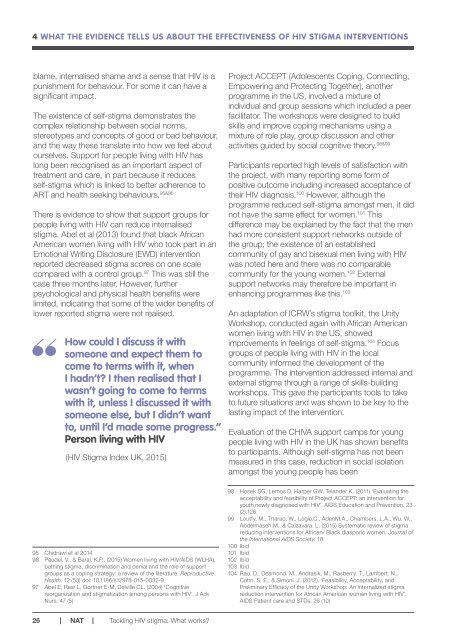Tackling HIV Stigma What works?
Jun_16_Tackling_HIV_Stigma
Jun_16_Tackling_HIV_Stigma
Create successful ePaper yourself
Turn your PDF publications into a flip-book with our unique Google optimized e-Paper software.
4 WHAT THE EVIDENCE TELLS US ABOUT THE EFFECTIVENESS OF <strong>HIV</strong> STIGMA INTERVENTIONS<br />
blame, internalised shame and a sense that <strong>HIV</strong> is a<br />
punishment for behaviour. For some it can have a<br />
significant impact.<br />
The existence of self-stigma demonstrates the<br />
complex relationship between social norms,<br />
stereotypes and concepts of good or bad behaviour,<br />
and the way these translate into how we feel about<br />
ourselves. Support for people living with <strong>HIV</strong> has<br />
long been recognised as an important aspect of<br />
treatment and care, in part because it reduces<br />
self-stigma which is linked to better adherence to<br />
ART and health seeking behaviours. 95&96<br />
There is evidence to show that support groups for<br />
people living with <strong>HIV</strong> can reduce internalised<br />
stigma. Abel et al (2013) found that black African<br />
American women living with <strong>HIV</strong> who took part in an<br />
Emotional Writing Disclosure (EWD) intervention<br />
reported decreased stigma scores on one scale<br />
compared with a control group. 97 This was still the<br />
case three months later. However, further<br />
psychological and physical health benefits were<br />
limited, indicating that some of the wider benefits of<br />
lower reported stigma were not realised.<br />
How could I discuss it with<br />
someone and expect them to<br />
come to terms with it, when<br />
I hadn’t? I then realised that I<br />
wasn’t going to come to terms<br />
with it, unless I discussed it with<br />
someone else, but I didn’t want<br />
to, until I’d made some progress.”<br />
Person living with <strong>HIV</strong><br />
(<strong>HIV</strong> <strong>Stigma</strong> Index UK, 2015)<br />
Project ACCEPT (Adolescents Coping, Connecting,<br />
Empowering and Protecting Together), another<br />
programme in the US, involved a mixture of<br />
individual and group sessions which included a peer<br />
facilitator. The <strong>works</strong>hops were designed to build<br />
skills and improve coping mechanisms using a<br />
mixture of role play, group discussion and other<br />
activities guided by social cognitive theory. 98&99<br />
Participants reported high levels of satisfaction with<br />
the project, with many reporting some form of<br />
positive outcome including increased acceptance of<br />
their <strong>HIV</strong> diagnosis. 100 However, although the<br />
programme reduced self-stigma amongst men, it did<br />
not have the same effect for women. 101 This<br />
difference may be explained by the fact that the men<br />
had more consistent support net<strong>works</strong> outside of<br />
the group; the existence of an established<br />
community of gay and bisexual men living with <strong>HIV</strong><br />
was noted here and there was no comparable<br />
community for the young women. 102 External<br />
support net<strong>works</strong> may therefore be important in<br />
enhancing programmes like this. 103<br />
An adaptation of ICRW’s stigma toolkit, the Unity<br />
Workshop, conducted again with African American<br />
women living with <strong>HIV</strong> in the US, showed<br />
improvements in feelings of self-stigma. 104 Focus<br />
groups of people living with <strong>HIV</strong> in the local<br />
community informed the development of the<br />
programme. The intervention addressed internal and<br />
external stigma through a range of skills-building<br />
<strong>works</strong>hops. This gave the participants tools to take<br />
to future situations and was shown to be key to the<br />
lasting impact of the intervention.<br />
Evaluation of the C<strong>HIV</strong>A support camps for young<br />
people living with <strong>HIV</strong> in the UK has shown benefits<br />
to participants. Although self-stigma has not been<br />
measured in this case, reduction in social isolation<br />
amongst the young people has been<br />
95 Chidrawi et al 2014<br />
96 Paudel. V., & Baral. K.P., (2015) Women living with <strong>HIV</strong>/AIDS (WLHA),<br />
battling stigma, discrimination and denial and the role of support<br />
groups as a coping strategy: a review of the literature. Reproductive<br />
Health. 12 (53) doi: 10.1186/s12978-015-0032-9<br />
97 Abel E, Rew L, Gortner E-M, Delville CL. (2004) ‘Cognitive<br />
reorganization and stigmatization among persons with <strong>HIV</strong>’. J Adv<br />
Nurs. 47 (5)<br />
98 Hosek SG, Lemos D, Harper GW, Telander K. (2011) ‘Evaluating the<br />
acceptability and feasibility of Project ACCEPT: an intervention for<br />
youth newly diagnosed with <strong>HIV</strong>’. AIDS Education and Prevention. 23<br />
(2):128<br />
99 Loutfy. M., Tharao. W., Logie.C., AdenM.A., Chambers. L.A., Wu. W.,<br />
Abdelmaseh.M., & Calzavara. L. (2015) Systematic review of stigma<br />
reducing interventions for African/ Black diasporic women. Journal of<br />
the International AIDS Society. 18<br />
100 Ibid<br />
101 Ibid<br />
102 Ibid<br />
103 Ibid<br />
104 Rao. D., Desmond. M., Andrasik. M., Rasberry. T., Lambert. N.,<br />
Cohn. S. E., & Simoni. J. (2012). ‘Feasibility, Acceptability, and<br />
Preliminary Efficacy of the Unity Workshop: An internalized stigma<br />
reduction intervention for African American women living with <strong>HIV</strong>’.<br />
AIDS Patient care and STDs, 26 (10)<br />
26 NAT<br />
<strong>Tackling</strong> <strong>HIV</strong> stigma: <strong>What</strong> <strong>works</strong>?


